New Delhi, Delhi, 6th of September, 2024 : The National Conference ‘Universal Access to Healthcare: Digital Solutions’ in New Delhi concluded with several key suggestions optimizing the use of technology to achieve Universal Health Coverage. It was organised by the Sakala Foundation with the support of the National Human Rights Commission (NHRC), India, NITI Aayog and the Ministry of Health & Family Welfare. Inaugurating it, Dr. V.K. Paul, Member (Health), NITI Aayog said a collective thinking can help chart out a course of action to make sure that healthcare services are available to the people of India. He said there were positive developments in health sector in the private sector as well.
Pointing out that India’s leadership in digital technology has been accepted globally, Dr. Paul said that India launched the Global Initiative on Digital Health (GIDH) with the WHO during the G20 Health Ministerial Meeting last year. As a WHO Managed Network, GIDH aims to consolidate and amplify recent and past gains in global digital health while strengthening mutual accountability and serving as a vehicle for implementing the Global Strategy on Digital Health 2020–25.
Dr. Paul stressed on the need for using and scaling up technology while at the same time protecting the human rights through privacy protection, safety from cybercrimes and frauds, bridging the digital gap and promoting user-friendly technology that promotes the ease of living making technology useable and accessible. It should enhance the quality of life and wellbeing, he said.
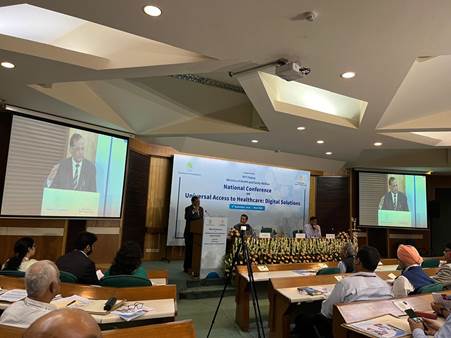
Delivering the keynote address, Mr Apurva Chandra, Secretary, Ministry of Health & Family Welfare announced that India was working towards creating a life-long health record for every individual in coming days. To begin with, the Ministry would be launching U-Win App that would record close to 2.7 crore newborns and 3 crore mothers in the country. This would be an Aadhar-based record of the vaccinations of baby and would subsequently be also linked to the Anganwadi Centres, Poshan tracker and even with the school health programme.
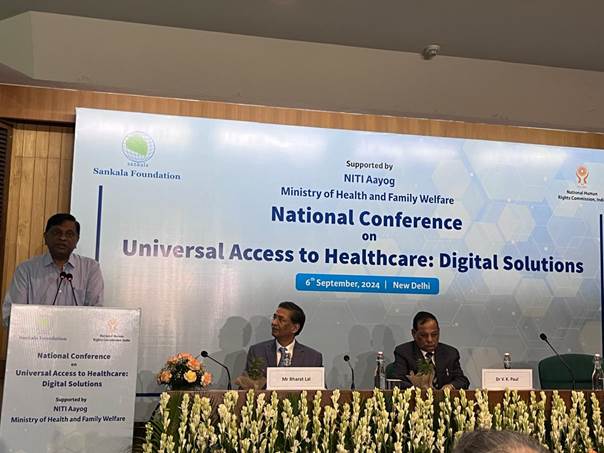
Further, to streamline and standardise health insurance claim processing and improving the patient experience, the government has also taken on board 41 insurance companies, 7 TPAs and 400 hospitals on board under the National Health Claims Exchange gateway under the Ayushman Bharat Digital Mission.
Mr Bharat Lal, Secretary General, National Human Rights Commission (NHRC), India in his address emphasized that there is a need for various stakeholders in the health sector to come together to ensure that healthcare for all becomes a reality. Mr Lal said that healthcare is a basic human right and the full potential of an individual cannot be realised without ensuring quality healthcare services to every individual throughout their life. He mentioned that the potential of technology in delivering healthcare facilities and improving of quality of life of every individual is essential. He said that the technology holds the future of affordable and quality health care.
Mr Lal highlighted that the NHRC, India is also focussing on marginalized sections of society like people suffering from mental health issues, leprosy, older persons, widows, beggars, etc. so that human rights can be enjoyed by every individual. The Commission works with the approach that no one is left behind, he added.
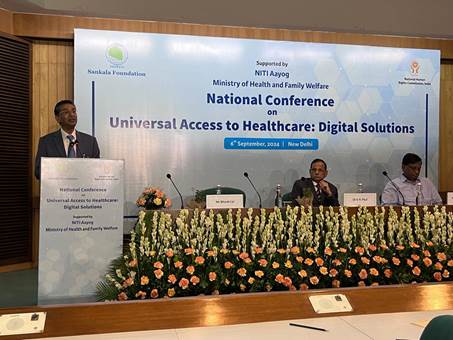
A Report Leveraging Digital Solutions for Universal Health Coverage prepared by Sankala Foundation was also released on the occasion. The Digital Nerve Centre (DiNC) is a unique health care delivery model in Kolar district of Karnataka. It has streamlined processes in public health facilities, reduced patient overload in secondary and tertiary hospitals, and increased the utilisation of primary health centres (PHCs).
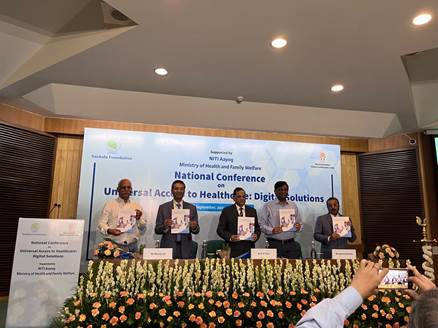
Being implemented since 2017, it has been devised and is being implemented by the TATA Medical and Diagnostics (TATA MD) in collaboration with the Department of Health and Family Welfare, Government of Karnataka. At present, 90 health facilities including 82 PHCs, two community health centres (CHCs), five taluka (Sub District) hospitals (TH), and one district hospital (DH) are covered by the DiNC.
The conference brought together experts, government officials, and various stakeholders from the health and health technology sector together for achieving the goal of Universal Health Coverage by the year 2030.
Chairing the first technical session on `Models of Change in Healthcare’, Mr Bharat Lal said technology had a profound impact on the lives and livelihoods of the people, and thus is a leapfrog factor in ensuring basic services. Mr Basant Garg, Additional CEO, National Health Authority (NHA) said that technology had helped in reaching out to 55 crore people under the Ayushman Bharat-Pradhan Mantri Jan Aarogya Yojana through the use of digital technology and these were people who would otherwise not have been able to access and achieve specialised healthcare.
Spelling out various technology-driven initiatives under the NHA, he said that the patient is always at the centre. Mr Madhukar Kumar Bhagat, Joint Secretary (E-Health), Ministry of Health & Family Welfare said that inaccessibility and unaffordability of quality health services was a violation of human rights and technology can help in overcoming this along with capacity building and standardisation. Mr Girish Krishnamurthy, CEO and Managing Director, Tata MD said that adoption of technology in healthcare has always been slow though it has the potential to be the core of healthcare and not just an enabler. Talking about Andhra Pradesh’s Telemedicine Programme, Mr Chevvuru Hari Kiran, Director, Health & Family Welfare said that 60-65% of people in the State were opting for public health services.
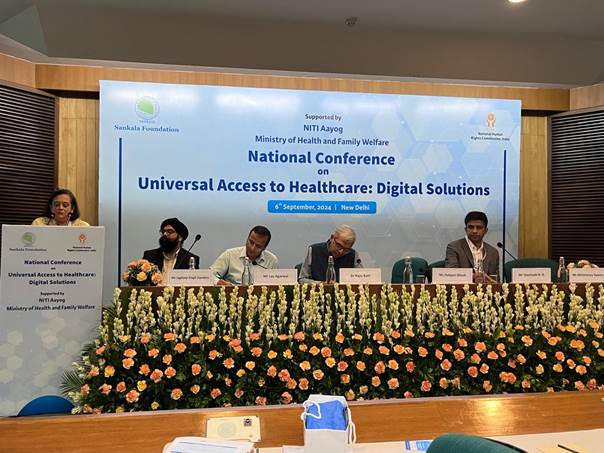
Chairing the second technical session on `Future Frontiers in Digital Health,’ Dr Rajiv Bahl, DG, ICMR focussed on the ethical use of Artificial Intelligence in health research and spoke about the National Institute of Health and Artificial Intelligence set up by the Council. Advocating for the integration of data, Mr Lav Agarwal, Resident Commissioner, Andhra Pradesh Government said that data in India was available in silos and technology was frugal. Ms Debjani Ghosh, President NASSCOM, said India should not be the market for health solutions.

In the third technical session on `Technology-enabled Universal Health Coverage,’ Mr C.K. Mishra, former Secretary Ministry of Health & Family Welfare and Advisor IPE Global said that technology should reduce the cost of healthcare.
Mr S. Krishnan, Secretary, Ministry of Electronics & Information Technology, said that technology can be an enabler in healthcare but it cannot substitute for healthcare workers. He spoke about India’s AI Mission that would help in crunching large volumes of data and making this data base useable. The largest chunk of database is from the health and insurance sector.
Prof Manohar Agnani, Professor (Public Health), Azim Premji University and former Additional Secretary, Ministry of Health & Family Welfare said that there were several models such as the DiNC Model of Kolar in Karnataka that could be replicated. He highlighted the need for creating institutional frameworks and stringent regulations for the use of technology.
The conference concluded that India was ready to roll out the `Amritkaal’ version of technology and the time was right for the comprehensive use of technology and AI in primary healthcare, validation of data was critical, India cannot be a market for healthcare solutions and there was a need for a change in medical education.
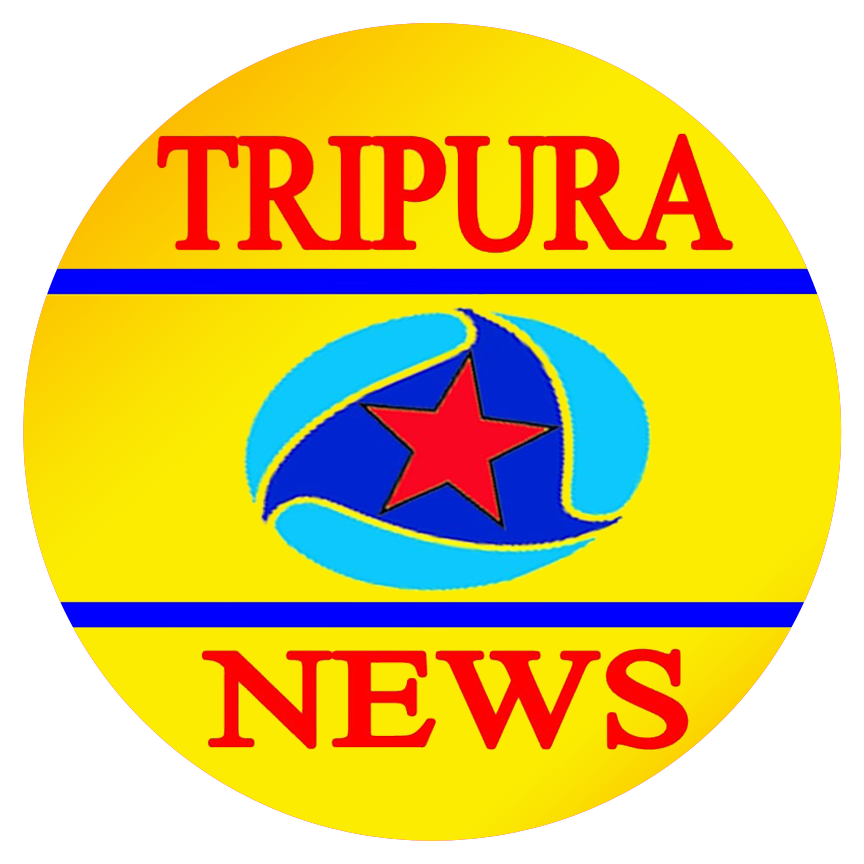








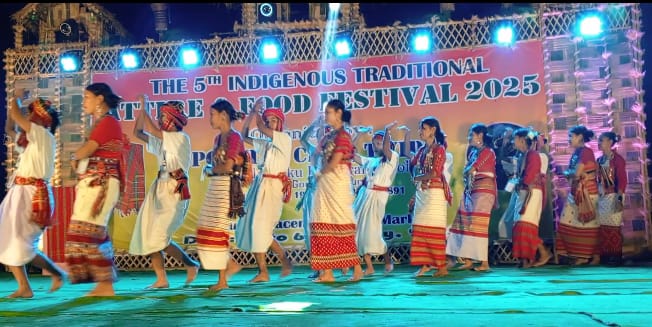
More Stories
Abhinaba Banik Of RMV Is Going To Represent The State Being State Youth Icon Student-Scientist At The National Youth Festival 2025 Called On By Prime Minister.
60th Formation Day Diamond Jubilee Celebrations Of THE INSTITUTE OF COST ACCOUNTANTS OF INDIA – Hyderabad Chapter.
Abeer Khan’s Debut Film ‘Mission Grey House’ Trailer Launched , Actress Nihat Khan will play important role.